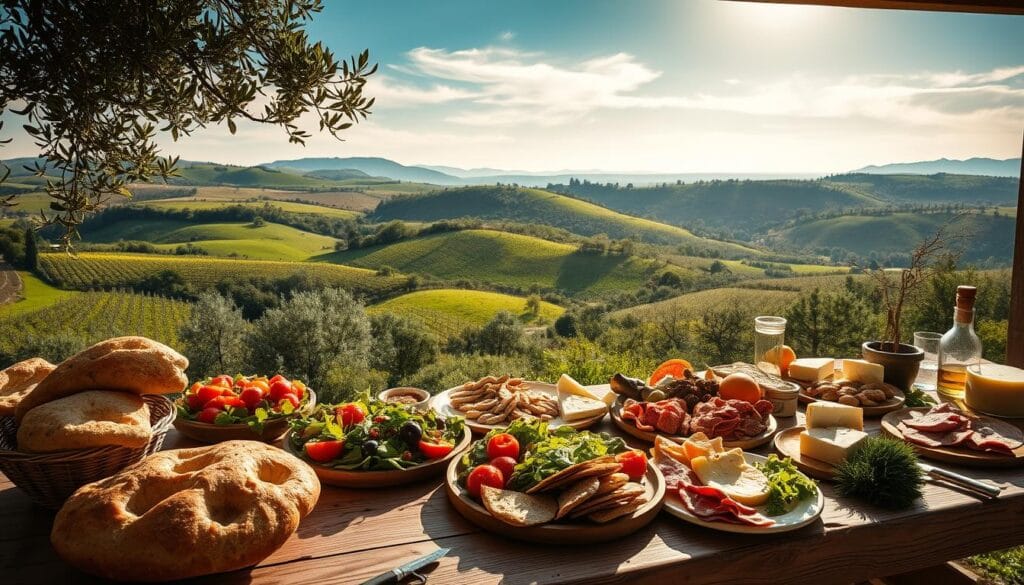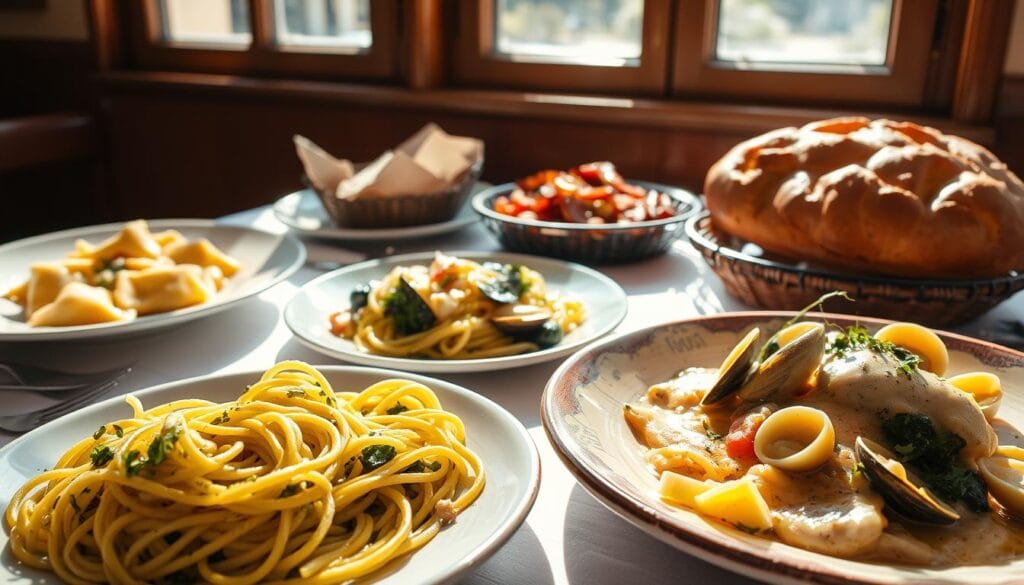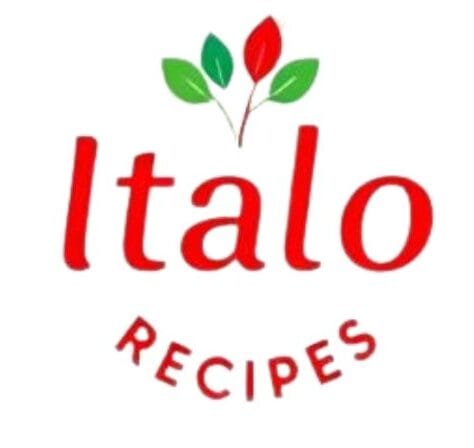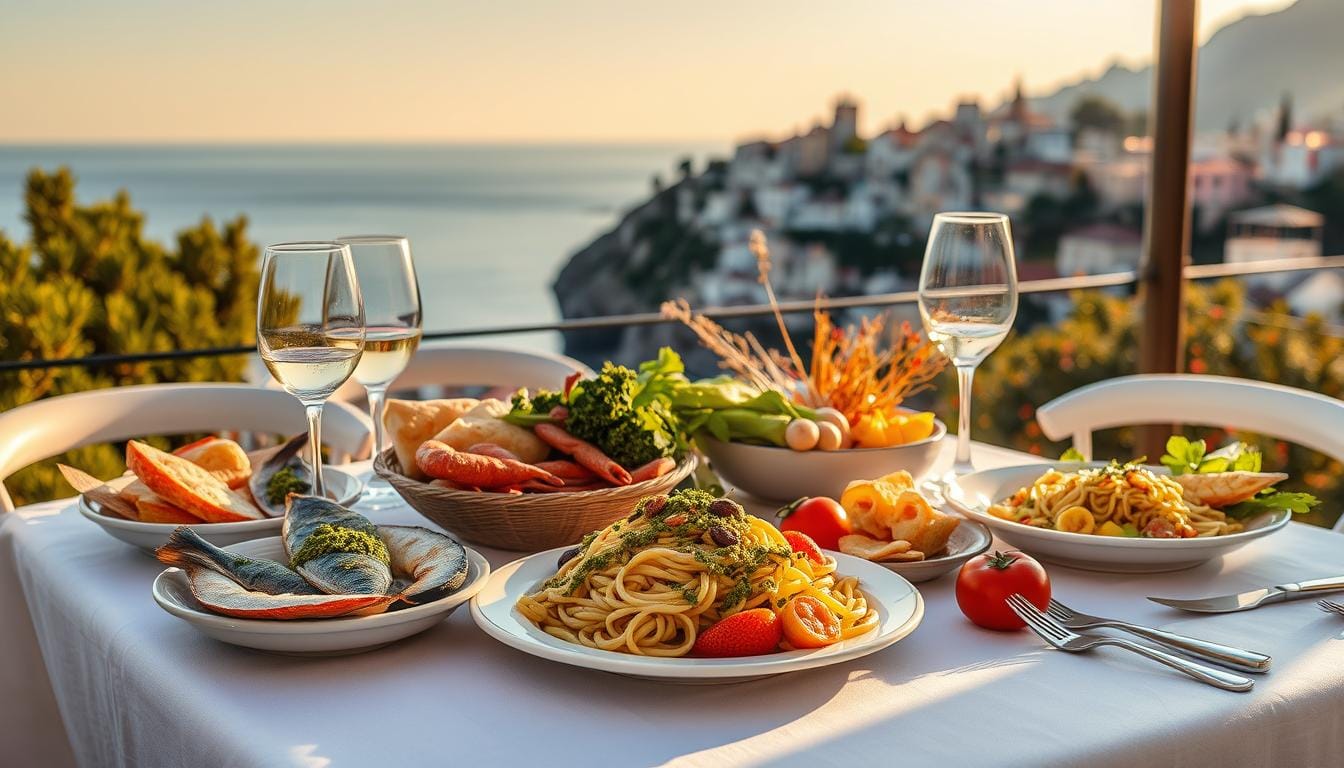Eat in Liguriain 2025:What to eat between sea and land, famous dishes and curiosities to know
Imagine walking through Liguria’s beautiful streets, with the Mediterranean Sea and Apennine Mountains around you. The smell of Ligurian cuisine fills the air, making you want to try the local dishes.
Ligurian food is special, thanks to its location and cooking traditions. It’s all about the fresh seafood, local herbs, and vegetables. Each dish shows off the region’s rich culture.
As you explore, you’ll find many traditional Ligurian dishes to enjoy. Whether you love food or just want to try something new, Liguria has it all.
Table of Contents
Key Takeaways
- Discover the unique flavors of Ligurian cuisine
- Explore the region’s rich culinary traditions
- Learn about the local ingredients and specialties
- Find out what to eat in Liguria for a authentic experience
- Get an insider’s look at the traditional Ligurian dishes
The Culinary Landscape of Liguria in 2025
Liguria’s food scene in 2025 is a mix of old recipes and new ways of cooking. It also focuses on being green. You’ll see a balance of traditional tastes and fresh ideas.
Evolution of Traditional Cuisine in Modern Times
Ligurian food is changing, keeping old tastes but using new methods. This change is seen in two main ways:
New Cooking Techniques Preserving Ancient Flavors
Modern chefs use sous vide and molecular gastronomy to update old dishes. These methods keep the original flavors but make the food more exciting.
The Revival of Forgotten Recipes
There’s a push to bring back old Ligurian dishes. This effort not only adds to the food scene but also saves the region’s culinary history.
The Influence of Sustainability on Ligurian Food Culture
Sustainability is key in Ligurian food, changing how we make and eat food. Two big efforts are making a big difference:
Zero-Waste Cooking Initiatives
Zero-waste cooking is becoming popular. Chefs use every part of an ingredient to cut down on waste. This not only helps the planet but also sparks creativity in the kitchen.
Local Sourcing and Carbon Footprint Reduction
There’s a big push for local sourcing. Restaurants and producers choose ingredients from nearby farms and sea. This cuts down on carbon emissions and supports local businesses.
What Do You Eat in Liguria? A Comprehensive Overview
In Liguria, the Mediterranean diet is the base for many tasty dishes. You’ll find a mix of old traditions and new ideas. This is thanks to the region’s rich land and fresh sea food.
The Mediterranean Diet Foundation
The Mediterranean diet is more than food in Liguria; it’s a lifestyle. Olive oil, a key part of Ligurian cooking, is known for its quality and use.
Olive Oil: The Liquid Gold of Liguria
Liguria’s olive oil is famous for its taste and health perks. You can find it in salad dressings and sautéed veggies.
Fresh Produce and Seasonal Eating
Eating what’s in season is key in Liguria. This makes sure dishes are always fresh and tasty. You’ll find a variety of veggies, herbs, and fruits all year.
Balancing Tradition and Innovation in 2025
Ligurian food is not just old recipes; it also welcomes new ideas. You can see this mix in both modern restaurants and home cooking.
Fusion Influences on Classic Dishes
Modern Ligurian food often mixes old recipes with new flavors. This creates unique dishes that still respect their roots.
Technology in Food Preservation and Presentation
Technology helps keep Ligurian ingredients fresh and tasty. You’ll enjoy dishes that are not only good to eat but also look great.
| Ingredient | Traditional Use | Modern Twist |
|---|---|---|
| Olive Oil | Salad dressings, sautéing | Infused with herbs, used in desserts |
| Fresh Herbs | Pesto, sauces | Used in fusion dishes, as garnishes |
| Seafood | Grilled or in stews | Sashimi, seafood risotto |
The Treasures of the Ligurian Sea: Seafood Specialties
The Ligurian Sea is a treasure trove of fresh seafood. It’s the base for many of the region’s iconic dishes. As you explore Liguria’s seafood, you’ll find a wide variety of fresh fish and shellfish. They are prepared to show off their natural flavors.
Fresh Fish Varieties and Their Preparation
Liguria’s coastal waters are home to many fresh fish. You’ll find anchovies, sea bream, and sea bass. These fish are prepared using traditional methods to highlight their freshness and quality.
Anchovies of Monterosso
Monterosso’s anchovies are famous for their rich flavor and tender texture. They are often marinated or fried. This makes for a delicious appetizer or side dish.
Sea Bream and Sea Bass Dishes
Sea bream and sea bass are common in Ligurian waters. They are prized for their delicate flavor. They are often grilled or baked with herbs and served with fresh vegetables.
Shellfish Delicacies of the Ligurian Coast
The Ligurian coast is also famous for its shellfish delicacies. You’ll find mussels, clams, squid, and octopus. These are prepared in traditional dishes that combine the freshness of the seafood with local herbs and flavors.
Mussels and Clams in White Wine
Mussels and clams are a staple in Ligurian cuisine. They are often cooked in a white wine broth with garlic and herbs. This simple yet flavorful preparation allows the natural sweetness of the shellfish to shine.
Squid and Octopus Specialties
Squid and octopus are commonly used in Ligurian seafood dishes. They are often grilled or fried and served with a squeeze of lemon. Their tender texture and rich flavor make them a favorite among locals and visitors alike.
Modern Sustainable Fishing Practices in 2025
In 2025, the Ligurian fishing industry continues to embrace sustainable practices. This ensures that the region’s seafood remains a renewable resource for future generations. Techniques such as catch limits and marine protected areas help maintain the health of fish populations.
| Seafood Type | Traditional Preparation | Modern Twist |
|---|---|---|
| Anchovies | Marinated or Fried | Anchovy Pâté on Toast |
| Sea Bream/Sea Bass | Grilled or Baked with Herbs | Pan-Seared with Citrus Sauce |
| Mussels/Clams | Cooked in White Wine Broth | Steamed with Asian Spices |
From the Hills to Your Plate: Land-Based Delicacies

Exploring Liguria’s food scene reveals a world of land-based treats. The region’s hills and countryside are rich in ingredients. These are turned into delicious dishes in local kitchens, offering a unique taste experience.
Vegetables and Herbs in Ligurian Cuisine
Ligurian food heavily features local veggies and herbs. These are mixed in creative ways to make tasty dishes. Artichokes from Albenga are especially famous for their tender taste.
Artichokes of Albenga
The artichokes from Albenga are a key ingredient in Ligurian dishes. They’re used in risottos, pasta, and as a side. Their flavor comes from the region’s mild weather and rich soil.
Wild Herbs and Their Culinary Uses
Preboggion wild herbs are a staple in Ligurian cooking. They add depth to soups, stews, and stuffings. Foraged from the wild, they’re fresh and full of taste.
Meat Dishes of the Ligurian Countryside
Meat is a big part of Ligurian land-based food. Dishes often feature rabbit, game, veal, and beef. These meats are slow-cooked to enhance their flavors.
Rabbit and Game Preparations
Rabbit is a favorite in Ligurian cooking, often in stews or roasted. Game meats are also loved for their rich taste. They’re cooked using traditional methods.
Veal and Beef Specialties
Veal and beef are used in many Ligurian dishes, like stews and roasted meats. They’re served with local veggies, making for hearty meals.
Farm-to-Table Innovations in 2025
In 2025, Ligurian food will see more farm-to-table ideas. These focus on local ingredients and sustainable farming. Restaurants and producers are working together to create menus that highlight the region’s produce in new ways.
By using seasonal ingredients and traditional cooking, Ligurian chefs are innovating in farm-to-table cuisine. They offer diners a fresh and genuine taste experience.
Pesto and Beyond: Iconic Sauces of Liguria
Liguria’s flavors shine in its rich sauces, showing off the region’s cooking skills. These sauces add depth to dishes and celebrate Liguria’s culinary history.
The Art of Traditional Pesto Genovese
Pesto Genovese is a highlight of Ligurian sauces. It’s made the old way, with a marble mortar and wooden pestle. This shows the region’s dedication to cooking.
The Seven Sacred Ingredients
Pesto Genovese’s secret is its seven key ingredients. These are fresh basil, garlic, pine nuts, coarse salt, Parmigiano-Reggiano cheese, Pecorino or Fiore Sardo cheese, and extra virgin olive oil. Each one is vital for its unique taste.
- Fresh basil gives the sauce its bright color and smell.
- Garlic adds a strong flavor that’s balanced by other ingredients.
- Pine nuts add a rich, nutty taste.
- Coarse salt boosts the flavor.
- Parmigiano-Reggiano and Pecorino or Fiore Sardo cheeses add a salty, savory taste.
- Extra virgin olive oil brings everything together, making it smooth.
Modern Variations and Adaptations
Traditional Pesto Genovese is still loved, but new versions have appeared. These include spinach, almonds, or vegan cheese. They meet different tastes and diets, keeping Pesto Genovese fresh in today’s cooking.
Lesser-Known Ligurian Sauces Worth Discovering
Liguria has more than just Pesto Genovese. There are many other tasty sauces to try. They show the region’s creativity and variety.
Walnut Sauce for Pansoti
Walnut sauce is a classic with pansoti. It’s made with walnuts, garlic, breadcrumbs, Parmigiano-Reggiano cheese, and olive oil. This sauce is a great example of using local ingredients.
Marò and Other Regional Specialties
Marò is a simple sauce of tomatoes, garlic, and basil. It’s as tasty as Pesto Genovese but simpler. It’s great with pasta or as a dip. Liguria also has sauces with mushrooms, capers, and olives, each with its own flavor.
Pasta and Bread: The Staples of Ligurian Cuisine

In Liguria, pasta and bread are more than just food. They show the region’s history, culture, and traditions. The area’s geography, from the sea to the hills, has shaped these staples.
Trofie, Pansoti, and Other Unique Pasta Shapes
Liguria boasts unique pasta shapes with their own stories. Trofie, a twisted pasta, is great with pesto. Pansoti, stuffed pasta triangles, are filled with greens and served with walnut sauce.
The Art of Handmade Pasta in 2025
In Liguria, making handmade pasta is still a cherished tradition. Local artisans create intricate shapes by hand, using techniques passed down through generations.
Stuffed Pasta Varieties and Fillings
Stuffed pasta is a big deal in Liguria. Fillings range from ricotta and spinach to herbs and cheeses. These fillings are chosen to match the pasta and sauces perfectly.
Focaccia and Farinata: Bread Traditions Reimagined
Liguria’s bread traditions are as rich as its pasta. Focaccia, especially Genovese focaccia, is a classic. This soft bread is topped with olive oil, herbs, and cheese.
Genoa’s Famous Focaccia
Genoa’s focaccia is famous for its soft texture and tasty toppings. It’s a must-try in Liguria.
Chickpea Farinata and Its Variations
Farinata, a thin, crispy pancake from chickpea flour, is a Ligurian favorite. It’s often enjoyed as a snack or appetizer, topped with onions, rosemary, or other local ingredients.
Wine and Beverage Pairings with Ligurian Cuisine
In Liguria, pairing local wines and beverages with dishes is a journey. It makes every meal special. You’ll find the right match makes the food taste even better.
White Wines of the Ligurian Coast
The Ligurian coast is famous for its crisp white wines. Vermentino and Pigato are top choices. They go great with seafood.
Vermentino and Pigato Varieties
Vermentino has a fresh, herb-like taste. Pigato is richer. Both pair well with Ligurian seafood.
Wine Tourism Experiences in 2025
Wine lovers can explore vineyards and learn about these wines. Vineyards offer tastings and tours. It’s a great way to see how wine is made.
Unique Local Spirits and Digestifs
Liguria is known for its spirits and digestifs. Enjoy them after meals. Sciacchetrà, a sweet wine from Cinque Terre, is a favorite.
Sciacchetrà: The Sweet Wine of Cinque Terre
Sciacchetrà is a dessert wine from Bosco, Albarola, and Vermentino grapes. It’s great with sweet Ligurian pastries.
Herbal Liqueurs and Their Traditions
Herbal liqueurs, like those from local herbs, are also popular. Enjoy them after dinner.
Non-Alcoholic Specialties
For those who don’t drink, Liguria has non-alcoholic options. Try limone e soda, a lemon soda made with local lemons.
Whether it’s Vermentino or a digestif, Liguria’s drinks make meals unforgettable.
Sweet Endings: Desserts and Confections of Liguria
Ligurian desserts show off the region’s rich food history. They use local ingredients and old-fashioned methods. You’ll find traditional pastries, new desserts, and creative uses of local honey and fruits.
Traditional Pastries and Their Modern Interpretations
Liguria is famous for its traditional pastries, now with a modern twist. Two examples stand out:
- Pandolce Genovese: A traditional Genoese sweet bread, now with new flavors.
- Canestrelli and Biscuit Varieties: These biscuits are made with local ingredients and come in many flavors.
Pandolce Genovese and Festival Sweets
Pandolce Genovese is a classic Ligurian dessert, enjoyed at festivals. Modern versions keep the traditional taste but add new ingredients.
Canestrelli and Biscuit Varieties
Canestrelli are a favorite in Ligurian bakeries. They’re made in many flavors, showing the region’s creativity with local ingredients.
Fruit-Based Desserts and Local Honey
Liguria’s desserts often use local fruits and honey. This creates a unique taste. Some highlights are:
- Chestnut Desserts from the Mountains: Made with chestnuts from the Ligurian mountains, these desserts have a rich flavor.
- Citrus and Olive Oil in Sweet Preparations: Citrus and olive oil add a special touch to desserts, blending flavors.
Chestnut Desserts from the Mountains
Chestnuts are a big deal in the Ligurian mountains. They’re used in many desserts, showing their versatility.
Citrus and Olive Oil in Sweet Preparations
Using citrus and olive oil in desserts shows Liguria’s love for innovation. It gives traditional desserts a refreshing twist.
Where to Experience Authentic Ligurian Cuisine in 2025
In 2025, exploring Liguria’s true flavors means diving into its authentic culinary scene. You’ll find a rich gastronomic heritage in many places. From famous restaurants by the sea to hidden spots in the countryside.
Renowned Restaurants Along the Riviera
The Ligurian Riviera boasts many top-notch restaurants. Here, you can enjoy Michelin-starred experiences that take traditional Ligurian dishes to the next level.
Michelin-Starred Experiences
Places like Ristorante La Merenda in Camogli serve refined local dishes. It promises a memorable dining experience.
Seaside Trattorias and Authentic Eateries
For a casual yet authentic taste, try seaside trattorias. Trattoria da Fiore in Sestri Levante is a great spot. It offers fresh seafood and traditional recipes.
Hidden Gems in Inland Villages
Liguria’s inland villages also have culinary treasures. Here, you can find agriturismo dining experiences that offer a real taste of local life.
Agriturismo Dining Experiences
Agriturismos like Agriturismo La Collina provide farm-to-table meals. They showcase the region’s produce and traditional cooking.
Family-Run Establishments Worth the Journey
Family-run eateries like Osteria della Fontanella in Fontanigorda serve hearty, homemade dishes. They reflect the local culture.
Food Festivals and Culinary Events
Liguria’s culinary calendar in 2025 is packed with food festivals and culinary events. Join the Festa della Focaccia in Genoa or the Sagra del Pesto in various towns. These events celebrate the region’s iconic dishes.
Conclusion: Embracing the Complete Ligurian Culinary Experience
Exploring Liguria in 2025 reveals a world of flavors. The sea’s freshness meets the land’s bounty. This journey takes you through traditional dishes and new creations, all highlighting Liguria’s unique taste.
Ligurian cuisine is a treasure trove of flavors. You’ll find pesto Genovese, seafood, and land-based dishes. It’s a chance to dive into the local culture, from the Mediterranean diet to traditional pasta and bread.
Indulging in local wines, spirits, and desserts reveals perfect pairings. Whether at famous restaurants or hidden spots, Liguria’s food invites you to explore and enjoy its true flavors.

